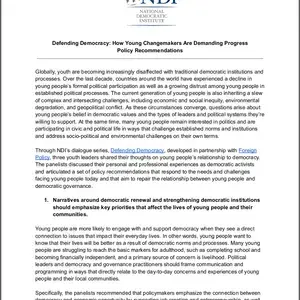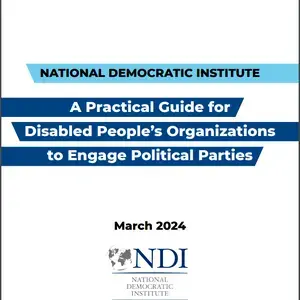Mozambicans want to have a say in their government’s pending overhaul of the electoral and governing systems, according to NDI’s new public opinion study, Building a More Representative Democracy.
The study revealed that citizens of the southeastern African nation are convinced of the importance of democratic institutions, including free elections, a dynamic party system and protection of fundamental freedoms, such as the freedom of speech. The participants are optimistic about the country’s path toward democracy, though they express concern with persistent poverty, unemployment and unfair distribution of resources among the country’s regions.
Since the end of the civil war in 1992, Mozambique has made considerable strides in alleviating poverty and in establishing a working democracy. Still, significant challenges remain in establishing a more pluralistic society.
Since the country’s first multiparty elections in 1994, political power has been concentrated in the hands of the ruling party at both the national and municipal levels. Following accusations of electoral irregularities in the 2009 legislative elections, parliament began a reform of the country’s electoral legislation. Political parties and coalitions of nongovernmental organizations (NGOs) presented seven draft bills to the Assembly of the Republic, covering topics such as the composition of the National Electoral Commission and how to deal with discrepancies in ballot counting.
Concurrently, the ruling party announced its intention to amend the constitution, which would allow for an even wider revision of the country’s electoral and governing system. Despite the moderate involvement of NGOs, Mozambican civil society and citizens at-large have remained outside these important debates.
The research was conducted in partnership with the Center for Research on Democracy and Development (Centro de Estudos da Democracia e Desenvolvimento, CEDE), NDI’s civil society partner organization in Mozambique. The results represent contributions from 43 focus group discussions conducted from June 26 to July 30, 2011, in all 10 provinces and in the capital, Maputo. A total of 615 Mozambicans participated in the study.
The research revealed most participants do not feel elected officials represent their interests. According to the respondents, broken campaign promises and limited post-election interaction with legislators suggest elected officials don’t represent their constituents’ interests.
Most focus group participants see value in maintaining a multi-party system in Mozambique. They said the playing field in elections is not level for all political parties. Participants said Mozambique needs active opposition political parties to ensure a quality discussion of national issues and to lead to the emergence of more and better ideas for achieving progress in the country.
Concerning elections, most participants commended the electoral bodies for their work in the 2009 polls, though some made complaints about voter registration. When asked about the decline in voter turnout, respondents noted disillusionment with politicians and logistical challenges such as long traveling distances and lengthy queues. Additionally, citizens value domestic and international election observers for increasing transparency, helping discourage fraud, documenting irregularities and offering opinions on the credibility of the results. As one participant noted, international observers are “an outside eye [that] helps us to observe better.”
Ultimately, the report revealed that citizens wish to contribute to discussions on electoral and constitutional reforms. Participants favor term limits; a decentralized system for electoral grievances; and legal requirements for presidential candidacy. The research also revealed that, while there is little awareness of the ongoing constitutional amendment efforts in parliament, Mozambicans are convinced changes to the constitution must be approved by the citizens through a referendum.
The public opinion study was researched and written by Traci Cook, senior advisor and regional director for focus group research at NDI, and Guilherme Mbilana, program officer for CEDE and the technical oordinator for the civil society coalition Electoral Observatory.




